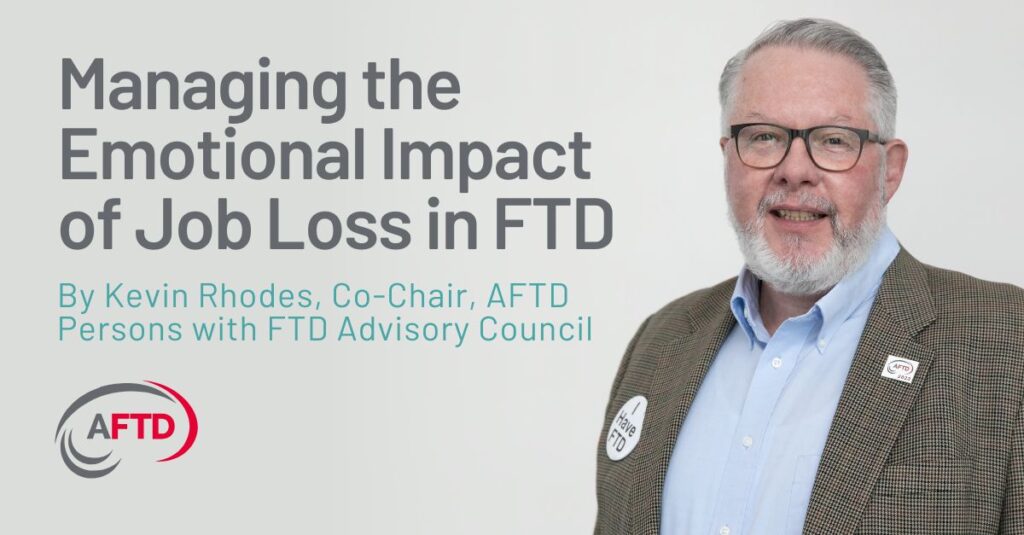Die gelebte Erfahrung von FTD: Umgang mit den emotionalen Auswirkungen des Arbeitsplatzverlusts bei FTD

When someone is diagnosed with FTD, it is almost guaranteed that they will eventually have to leave their job, usually long before they are ready to do so. The abrupt end of one’s career can cause depression (our jobs contribute significantly to our sense of self-worth) and stress (how will I pay my bills now?). It can also result in profound guilt: feeling like you are no longer a “productive member of society” is a heavy emotional burden to bear.
If you are currently navigating this situation, know that these circumstances are not your fault — you’re doing the best you can within a deeply challenging situation. Here are some suggestions to help you work through this new phase of your life.
Acknowledge Your Feelings
Recognize that guilt, anger, and sadness are all natural responses to major life changes, particularly when they impact your loved ones. Allow yourself to feel these emotions without judgment. It can help to write them down, or talk about them with someone you trust.
Reframe the Situation
Shift your focus from what you feel you’ve lost to what you are still contributing. Your presence, love, and emotional support are incredibly valuable. Helping others can be a great way to deal with the grief of your FTD. Although you may no longer have a job, many organizations are looking for volunteers just like you.
Communicate Openly
If your guilt stems from how you believe your loved ones are affected by your FTD diagnosis and subsequent job loss, have open conversations with them. You may find they are more understanding and supportive than you thought.
Set New Goals
In the absence of your career, small yet meaningful actions can help rebuild a sense of purpose. Identify ways to adjust your contributions, whether emotional, practical, or even creative. Maybe you once donated regularly to a favored nonprofit, but no longer have disposable income following your diagnosis. If that is the case, you can still donate your time as a volunteer. At many organizations, volunteering is just as valuable as your monetary support.
Seek Support
Consider joining support groups for individuals living with an FTD diagnosis. Sharing your experiences with others who understand can reduce feelings of isolation and guilt. AFTD offers multiple ways to access support – reach out to the AFTD HelpLine für mehr Informationen.
Professional counseling or therapy can also help you process and let go of guilt.
Practice Self-Compassion
Remind yourself that you didn’t choose FTD – it just happened. Treat yourself with the same kindness and understanding that you would offer a friend in your position. Practicing compassion on yourself is just as important as practicing compassion on others.
Engage in activities that bring you peace, like meditating, expressing your faith, going on nature walks, or taking part in your favorite hobbies. Remember that managing your health is a priority, and taking care of yourself is not selfish – it’s essential.
Focus on Financial Strategies
If financial stress is adding to your guilt, explore resources or benefits that might be available to help. If possible, consult a financial planner or advisor to help make the most of your current income and plan for the future. Organizations like AFTD may offer guidance – contact the AFTD HelpLine um mehr zu lernen.
AFTD’s Quality of Life Comstock Grant helps people living with FTD access services or supports to improve their quality of life. Applicants with a documented FTD diagnosis may apply for a $500 grant that can be used (with the support and supervision of a primary care partner as necessary) to purchase the goods or services of their choosing.
Finally: Remember that it’s OK to ask for help, and it’s OK to take things one step at a time. Your value as a person is not determined by your income or productivity, but by the relationships and impact you have on those around you.
Nach Kategorie
Unsere Newsletter
Bleib informiert
Melden Sie sich jetzt an und bleiben Sie mit unserem Newsletter, Veranstaltungsbenachrichtigungen und mehr auf dem Laufenden …
